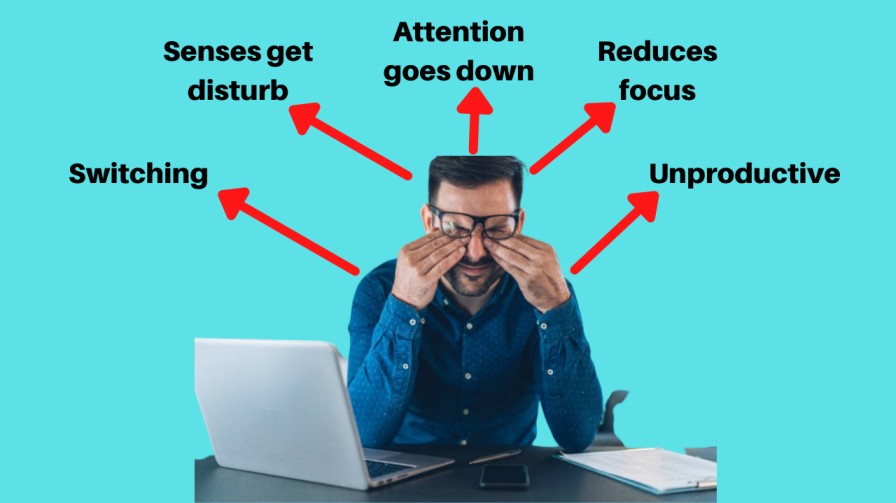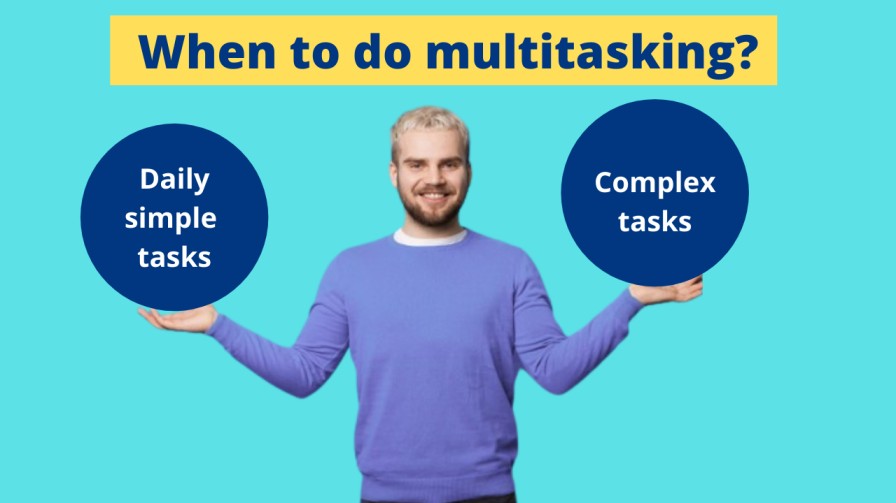Is it possible for humans to multitask? The most common question everybody has. Not everybody has the ability to do multitasking but yes some people are masters at this. Multitasking is actually a good way of doing a lot of things together but research has shown that it has a bad impact on our brain.
There are a lot of myths behind this so it’s better to understand this in detail. Research has found that multitasking makes us unproductive and reduces our attention span. On the other hand, there are some work areas where we humans have to do multitask, we can’t avoid it completely.
So in this article, I am going to discuss in detail when multitask is good for humans and when it is bad? How it affects our brain and performance? what can be done to avoid the impact of multitasking on our brain? Let’s start…
Table of Contents
Can humans really multitask?
Multitasking is the ability of a person to do multiple things at a time. This ability is viewed positively in today’s world. People use to think that the person who does multiple things at a time is actually an intelligent person and it is considered a sign of intelligence.
Most humans believe that multitask is a supernatural skill and we need to develop it to become successful in life. But is it really possible for a person to handle multiple tasks at a time and produce quality results from all tasks?
Personally, I think it is not possible, we can handle multiple tasks at a time but never expect quality results from it. Because great results are possible when we focus on one task at a time. Human brains are not designed to do multitasking but it is designed to handle one task at a time with full of concentration and sharp focus.

Multitasking is highly overrated in today’s world. The people who were unable to do multitasking they get depressed when they saw others doing it. But in reality, if the person does one task or job at a time then at the end of the day he will produce quality results and also complete more amount of work.
On the other hand, if the person does so many tasks at the same time then at the end of the day he will not able to produce quality output from his work. Because this habit of multitasking directly attacks your productivity, it makes you unproductive. Then how could you expect good output from your work? definitely, it’s not possible.
I have seen that most of the people used to complain that it’s very hard for them to constantly focus on their task it could be a study or some project work. Focus on one thing is impossible for them and in 90% of those cases, the main reason behind the problem is humans multitasking.
“Multitasking is directly proportional to lack of focus”
(The more your multitask the less focus you have)
What happens when humans multitask?
Well, it’s common nowadays that people love to do multiple things at a time like while eating they watch TV shows while working they love to scroll social media or reply the emails while talking with others they also send messages through WhatsApp, etc. These things have become habitual now.
Generally what happens when we humans do multitask? well, the worst thing that happens is we built up the habit of switching from one task to another and then back again. This constant switching is bad for our brain. Let me tell you the science behind how the human brain process tasks?
Brain tasks processing is done in 2 stages the first stage is Goal shifting this happens when we switch from one task to another. The second stage is Rule activation, this turns off the rules for the previous task and turns on the rules for the new task.
So when we do multitasking we are actually switching goals and turning the respective rules on and off in rapid succession. This switching constantly attacks our focus and concentration ability. For example – If you are doing some work on a laptop and at the same time you are scrolling the social media or replying to emails.
So here you are constantly switching from laptop to mobile phone and vice versa. This is very common nowadays at the workplace but every time when you switch yourself from one task to another you are actually disturbing your senses. When your senses get disturb your attention span goes down.

See while doing monotasking all our senses are completely involved in that task that’s why with monotasking we can produce great results. But in the case of switching, we disturb the senses continuously hence we lose our complete attention on that task.
Over the period of time, due to constant switching, we lose the focus and concentration ability of the brain and this makes us unproductive at whatever work we do whether it is a study or office work. We become the best inefficient worker.
See switching is easy for our brain, it can switch from one task to another without effort but it takes a lot of effort to focus on one task for a long time, and as I told you great results come when we do one task at a time with hyperfocus mode.
But by following the habit of switching we are allowing our brain to get disturbed every time, we are actually training our brain to not focus on one thing.
But you know this is a wrong practice. Instead of this what we have to do, we have to train our brain in such a way that it can focus easily on one task and for that, we need to get rid of this overrated habit of ‘multitasking’.
Why we should stop doing multitasking?
We have discussed earlier that how multitasking affects our brain and what happens when we practice multitasking. Now let see why we should stop doing it –
1. Multitasking is distracting –
- In multitasking, people continuously do multiple things at a time like while working on the laptop they also reply to emails, also place orders on Amazon or in-office replies to customer complaints, etc. While doing this they are more distracted than the person who does one task at a time.
- When they work on multiple things, every time they get distracted and refocus on new tasks, next time again distracted and refocus on the next task this cycle continues consistently which reduces the attention span of multitaskers and makes them permanently distracted.
2. Multitaskers face memory problems –
- Multitaskers try to manage multiple things at a time and because of which they don’t focus on a specific task for a long time. But our brain remembers things only when we focus on a particular task or work for a long time.
- Because the brain can’t process a lot of information at the same time, it takes time for processing. So the habit of multitasking reduces the working memory as well as the long-term memory of our brain and makes us dumb.
Check out – What are the different type of brain memory?
3. Multitasking reduces our working speed –
- As we discussed earlier, the biggest impact of multitasking is we built up the habit of switching from one task to other. Continuous switching not only reduces our attention span but also reduces our working speed.
- When we do one task at a time, in that case after some time we get into the Autopilot state or our brain gets into the flow state after that with less effort and high speed we can easily finish the work. But when we do multitasking, in that case, every time we are switching and never allowing our brain to get into the flow state so that our working speed goes down.
- If in general some tasks like study or project work will take 1hr to complete, but within that one hour if we try to do multitasking and allow ourselves to switch continuously then that 1hr work needs maybe 2hr or more than that. Because we are constantly busy in switching from one thing to another.
4. Multitasking makes you a Mistaker –
- Multitasking reduces our focus and concentration because when we do multiple things at a time, our focus or attention is divided between those multiple things so with a lack of focus it’s obvious that person will do a lot of mistakes.
- So the more you multitask, the higher the overlap of tasks in your mind and then the less focus you have hence you do more mistakes than when you do monotasking.
5. Multitasking reduces your Creativity –
- While multitasking we devote our attention to too many things at a time, because of which our brain can’t find a time to process information and is unable to think about some new ideas and concepts creatively.
- Due to continuous switching from one task to another, we never allow time for our brains to think creatively. That’s how the habit of humans to multitask reduces their ability of creative thinking, then they do the work just to finish it.
Here I have just highlighted some important reasons that why we humans should stop performing multitask. Some more reasons like It harms our brain, it wastes our valuable time due to switching, it causes anxiety/stress and sometimes depression also, it damages the stability of mind, makes us completely unproductive and inefficient, etc.
When to do multitasking and when not?
We have seen that multitasking is bad for our brain, it has a lot of disadvantages but then also we humans can’t completely avoid doing multitask in our life. Because there are some types of work or job which demands that as an employee we need to handle multiple tasks at the same time.
We can’t avoid it because it’s our job, we don’t have any other options. Then the big question comes when to do it and when not? Well, it depends on how important is the output of particular work or task? and impact of that output on our life? This will tell us when multitasking is ok and when not.
There are two types of tasks we humans perform in daily life, some are just daily routine activities and some are important work-related activities. For example, while walking in the garden we talk with others, sometimes housewives listen to music while cooking, While talking with friends we use social media or scrolling it. etc.
These all activities are examples of multitasking because we are doing two tasks at a time like walking and talking, listening and cooking, etc. These types of daily basic activities do not have a huge impact on our life so here it is ok to do multitasking. In such cases, multitasking actually helps you to complete daily activities quickly.

While on the other hand, there are some complex work or tasks that we need to do in daily life like at your workplace you are working on new projects, if you are a student and preparing for tough exams, If you are an author and writing a new book, if you are a businessman and taking important decisions daily,
If you are an athlete and practice 6hr daily, if you are a scientist and every time at your work you need to think a lot, It includes all important tasks or work that we do for a successful life. These types of work or tasks have a huge impact on our life, the output that we are getting from these types of tasks or work changes our life completely.
While doing these types of tasks or work you should strictly avoid doing multitasking. Because these activities need high focus and concentration, it also demands your brain creative thinking and fast decision-making ability, it also needs your full attention and energy.
Because when your brain is stable and fully focus while doing these types of activities you will produce greater results. So make sure you should never allow your brain to switch or do multitask during such type of complex activities which need your 100% attention and involves a lot of thinking.
Now you got cleared when it is ok to do multitasking and when it is not. So list down all your important daily activities and check how important their output is for you. Depending upon its impact on your life decide by yourself whether to go multitasking or not.
How to break the habit of multitasking?
We just discussed when it is ok for humans to multitask and when it is not? I mentioned that during complex tasks you should avoid multitasking but sometimes even if the task is complex and important in emergency situations we need to do multiple things at a time.
Well in that case there are some tips to follow which I would like to share with you so that you can better manage to multitask and produce good output from your work as well as reduce the impact of multitasking on your brain. Let’s have a look at that –
1. Avoid unnecessary distractions –
- When you are working in the office or doing study at home whatever important work that you are doing which needs your full attention, during that time period avoid all unnecessary distractions like scrolling social media, replying to messages or emails, even listening to music, talking on the phone, block notifications, etc.
- Keep separate time for those activities never mix up those with important work. By doing this you are not allowing your brain to continuously switch, you are actually breaking the habit of switching from one unnecessary task to another.
2. Arrange the work in a time frame or in the form of a batch –
- If you have a problem removing the distractions like social media or replying to messages when you are busy doing some important work means if you can’t able control that urge to check the notifications on your mobile phone and engage with other distractions, in that case batching your daily tasks can be a better option for you.
- You can allot time for each activity or task throughout the day, in that specific time you should work only on one task at a time. Until you complete the 1st task, you should never think about doing 2nd task.
- For example – you decided to finish four tasks in the next 4 hr, for the first 1 hr only focus on 1 task then for 2nd-hour focus only on 2nd task and like that, Never try to mix up these tasks until those tasks are related to each other. By batching your daily work activities you are helping your mind to focus easily.
Check out – 12 brain rules that will change your life forever
3. Use the 20-minute rule –
- Even if you are doing multitasking at least try to practice the habit of focusing on one task for min 20 min and a maximum of up to 45 minutes. In that 20 minutes just do one task and avoid switching from one task to another.
- For 20 min fully devote your attention to one task by using this method you are helping your brain to improve the focus even if you are busy doing multiple things at a time.
4. Practice mindfulness –
- Mindfulness means focusing on the present moment with full of awareness, not regretting the past, and not thinking about the future too much just be in present. Adding this mindfulness while doing daily important activities or multitasking helps you improve your focus and attention.
By using these 4 easy to follow techniques we humans can easily reduce the impact of multitask on our brain and better manage to do multiple things at a time.
But yes one thing keeps in mind, even if you are using these techniques while doing multitasking then also try to keep aside 3 to 4hrs every day in which you must practice monotasking it could be anything like reading a book, writing something, following a hobby, etc.
But keep yourself engaged with one task for at least 3 hr without any distraction or switching this will help your mind to build focus, concentration and also help to improve your attention span.
Conclusion –
I hope now you have got the answer to this question Can humans multitask? Multitasking is bad but then also we can’t avoid it completely in some situations.
So depending upon your situation if possible then first try to avoid doing multiple tasks at a time and if it’s not possible then use those 4 strategies to manage multiple tasks at a time effectively.
But always keep your first priority is to do monotasking because our brain is designed for that. So next time due to excitement if you are thinking about I can do multitasking, just remember these wonderful lines from the greatest monk Swami Vivekananda…
“Do one thing at a time and while doing it put your soul into it to the exclusion of all else then you will get extraordinary results”






Pingback: Multitask at work: 10 important tips to follow
Pingback: Why do I get so easily distracted? | Developstrongmind.com
Pingback: 70 Good Habits That Can Change Your Life forever